
Όταν αντί να απαντάμε σε ερωτήσεις σχετικά με πράγματα που έχουμε πει και έχουμε κάνει, βρίσκουμε τα δύσκολα, διακόπτουμε συνεντεύξεις και μετά ξεκινάμε συνωμοσιολογία, τα πράγματα -επικοινωνιακά τουλάχιστον- δεν πάνε και πολύ καλά.
Ο Τσίπρας ενοχλήθηκε από τις σκληρές ερωτήσεις δημοσιογράφου της Frankfurter Allgemeine Zeitung -είναι μία απ' τις σοβαρότερες ευρωπαϊκές εφημερίδες- και σηκώθηκε και έφυγε απ' τη συνέντευξη. Μαγκιά του. "Τον βρήκα επιθετικό τον δημοσιογράφο και δεν βρίσκω ευγενικό να σε πιέζουν" θα μπορούσε να είχε πει. Δεν είπε αυτό όμως.
Αμέσως απ' τον Σύριζα άρχισαν οι θεωρίες συνωμοσίας (ότι ο δημοσιογράφος χρησιμοποίησε "κουτσομπολιά" "γνώμες τρίτων" και "αδιασταύρωτες πληροφορίες" που πάρθηκαν από τον Παπαχελά, ότι η συνέντευξη θύμιζε "γαλάζια μονταζιέρα κλπ!).
Λες και δεν θα διέρρεαν οι ερωταπαντήσεις που, λυπάμαι που θα το πω, σε καμία περίπτωση δεν δείχνουν να βασίστηκαν σε "κουτσομπολιά" "γνώμες τρίτων" και "αδιασταύρωτες πληροφορίες", αλλά στα πεπραγμένα του Τσίπρα, στις πράξεις του, και στα δημοσιεύματα της Αυγής. Ευτυχώς οι συνεντεύξεις ηχογραφούνται.
Αν μου επιτρέπεται θα κάνω μια εικασία: πρόκειται περί παρεξήγησης. Ο δημοσιογράφος θύμισε στον Τσίπρα κάποιες δηλώσεις του, ο Τσίπρας είπε ότι δεν τις έκανε ποτέ (φυσικά και τις έκανε) και το πίστευε εκείνη τη στιγμή ότι δεν είχε κάνει τέτοιες δηλώσεις. Θύμωσε γιατί πίστευε ότι ο δημοσιογράφος προσπάθησε να τον παγιδεύσει με πλαστή δήλωση. Και έφυγε.
Ωραία ως εδώ. Μετά όμως, όταν είδε ότι είχε κάνει στ' αλήθεια τη δήλωση; (Και σιγά τη σπουδαία δήλωση.) Γιατί δεν είπε "σόρι, νόμιζα ότι με κορόιδευε ο Γερμανός και συγχύστηκα", παρά μόνο προσπάθησε να τους βγάλει όλους τρελούς;
Ναι. Οι Γερμανοί είναι εχθροί μας και τους μισούμε και δεν θέλουμε να μας κάνουν δύσκολες ερωτήσεις - και μπορεί όντως να κάνουν δύσκολες ερωτήσεις για να στριμώξουν τον Τσίπρα και όντως να ρωτούν τους "εχθρούς" του Τσίπρα για πιθανές ερωτήσεις.
Όμως δεν χρειάζεται να αυτοεξευτελιζόμαστε αν δεν κατέχουμε την τέχνη της επικοινωνίας. Δεν μας φταίνε πάντα οι άλλοι.

*Η πλήρης επιστολή του δημοσιογράφου στον Τσίπρα (και στην υπεύθυνη τύπου του)
Στα αγγλικά
(εδώ στα ελληνικά, συντομευμένη και λιγότερο ενδιαφέρουσα εκδοχή):
Istanbul, July 25th 2013
Dear Mr. Tsipras, Dear Mrs. Badogianni,
I hope this message finds you well. I have seen that "Avgi" has
published their version of the "interview" between FAZ and Mr.
Tsipras. We will publish our interpretation of the events in our
Sunday's edition and in some additional stories to follow in the days
after it. As you, Mrs. Badogianni, will play a role as well in the
story – first with your telephone interventions after the interview
and then with the letter you emailed to my editor today, which he
immediately forwarded to me - I wanted to ask you whether you want to
comment on your version of the events. I have prepared some questions
which you may answer on the record if you wish so. Since Syriza
decided to leak their version of the events to "Avgi", I take the
liberty to add some Greek and German friends and colleagues who might
be interested in the case as Bcc in this Email.
1. After the interview, you called journalists from "Kathimerini" and
myself, asking me whether I met Mr. Papachelas or any other colleague
from "Kathimerini" to prepare my questions. Even though it is none of
your business whom I meet to prepare an interview, I assured you
several times that I never in my life met Mr. Papachelas. Then you
asked me: "Are you sure you did not meet with any other colleague from
Kathimerini?" So my first question is: Do you find it normal that the
person in charge of press affairs of the opposition leader in an EU
member state, after an interview that was broken off by the
interviewee, is calling journalists and urges them to reveal whom they
have or have not met before the interview?
2. More precisely: Do you consider it normal that you call a foreign
correspondent to interrogate him about whom he spoke with to prepare
his questions?
3. Do you consider it normal that you, as press attaché of the leader
of the Greek opposition, ask Greek journalists whether they spoke to a
foreign journalist before an interview with Mr. Tsipras?
4. Regarding your Email to the editor of "Frankfurter Allgemeine
Zeitung" from today (July 24th) which you titled: „Written complaint
on behalf of Alexis Tsipras concerning the broken off interview with
FAZ on 19.07.2013". In this Email you, in the name of Mr. Tsipras,
claim that I went "way beyond the journalistic working ethics" and
used „rumours, statements of third persons and information taken
without double-checking" as a basis for my questions and thus was
unprofessional and even on the level of "yellow press"
("Klatschpresse"). You probably understand, that those are serious
allegations against a journalist who depends on his reputation. So I
would be very grateful if, regarding these allegations, you would be
so kind as to answer my following questions:
a) Is the cartoon of Adolf Hitler calling Angela Merkel (published in
"Avgi", on April 14th) to which I refereed in my first and second
question of the interview a "rumour, a statement of a third person or
an information taken without double-checking"?
b) In my third question I asked whether Mr. Tsipras believes that all
the talk about today's Germany being the "fourth Reich", wanting to
"colonize" Greece etc. is really the kind of language that European
leaders in 2013 should use. To this, Mr. Tsipras answered that
"neither Syriza nor Avgi" have ever uttered those kinds of statements.
Is it in your view a "rumour, a statement of a third person or an
information taken without double-checking" to point out – as one
example of many – to an article by "Avgi" dated 20.07.2013 with the
title "Gauleiter Schauble supports his students..." (author Dimitris
Stoumbos, link) below
http://www.avgi.gr/article/653893/o-gkaoulaiter-soimple-stirizei-tous-mathites-tou-
c) Is it in your view a "rumour, a statement of a third person or an
information taken without double-checking" to point out to a speech
given by Mr. Tsipras on 24/04/2013 at the American-Hellenic Chamber of
Commerce (link to the official transcript provided by the official
SYRIZA press office http://bit.ly/17AWFdh) where he said:
"Surrendering to Ms. Merkel's strategy creates the conditions for the
economic colonization of the country". Is a journalist who simply asks
Mr. Tsipras what he meant by that statement "yellow press"?
5. Regarding my fifth and last question that led Mr. Tsipras to break
off the interview. The question was: "In June 2012 you said Pasok / ND
"lowered the Greek flag and surrendered it to Angela Merkel". Could
you elaborate on what that means? Mr. Tsipras first said he "cannot
remember" whether he said the sentence about the lowered flag
surrendered to Angela Merkel by Pasok and ND, and later claimed he
"never" said that. Then he ended the interview telling me I have ill
intentions and am "not kind". Would you please comment:
a ) Is the enclosed link of the main campaign speech of Mr. Tsipras on
Omonia square on June 14th, 2012, where he utters exactly the sentence
(see timestamp 15.04) which I quoted in the interview and which lead
to the break off of the interview, in your eyes a falsification?
b) Is a journalist who relies on the website of Syriza to prepare his
questions guilty of using „rumours, statements of third persons and
information taken without double-checking", considering that according
to the website of Syriza he indeed uttered the sentence which he
claimed never to have uttered? (please check link or the screenshot
attached)
http://www.syriza.gr/ομιλία-του-αλέξη-τσίπρα-στην-κεντρική/
As you will have noticed, I did not criticise Mr. Tsipras, neither did
I dare to judge him for his statements. I simply quoted him and asked
him to explain what he meant by Pasok and Nea Dimokratia "surrendering
the Greek flag to Angela Merkel". I believe a journalist has the right
to ask those questions and should ask them. I also do not have a
problem with the fact that Mr. Tsipras broke off the interview because
he did not like my questions. Mr. Tsipras is not obliged to grant me
an interview and he of course may decide at any point to end a
conversation with me if he finds the questions "not suitable the the
leader of the Greek opposition", as you told me. However, does
confronting him with some of the sentences he said and asking him to
explain their meaning, make me "yellow press journalist" going "way
beyond the journalistic working ethics"? That seems a little
far-fetched, to put it mildly. If Mr, Tsipras, confronted with his own
quotes, calls me "unethical", that might indeed say more about him
then about me.
I am looking forward to your comments as they will be for sure an
important enrichment of our story on Sunday. I also attach my original
list of questions from FAZ to Mr. Tsipras. Even though you term them
"yellow press", I´d be very grateful if Mr. Tsipras, as promised in
the letter to the editor of FAZ, could answer them in written form.
I thank you in advance for your cooperation.
Best regards from Istanbul,
Michael Martens
Frankfurter Allgemeine Zeitung
Büro Istanbul / Istanbul office
Frankfurter Allgemeine Zeitung GmbH
Hellerhofstraße 2-4 · 60327 Frankfurt am Main
HRB 7344 . Amtsgericht Frankfurt am Main
Vorsitzender des Aufsichtsrats: Karl Dietrich Seikel
Geschäftsführung: Tobias Trevisan (Sprecher), Dr. Roland Gerschermann



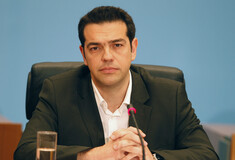











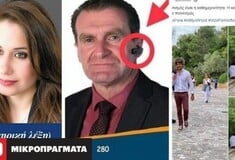

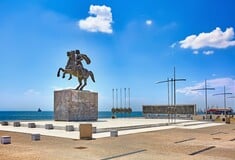

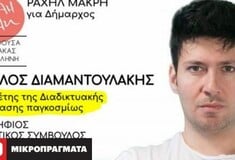

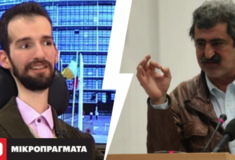

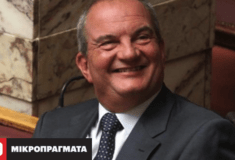

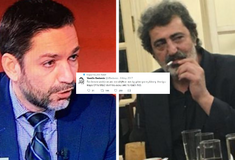




σχόλια